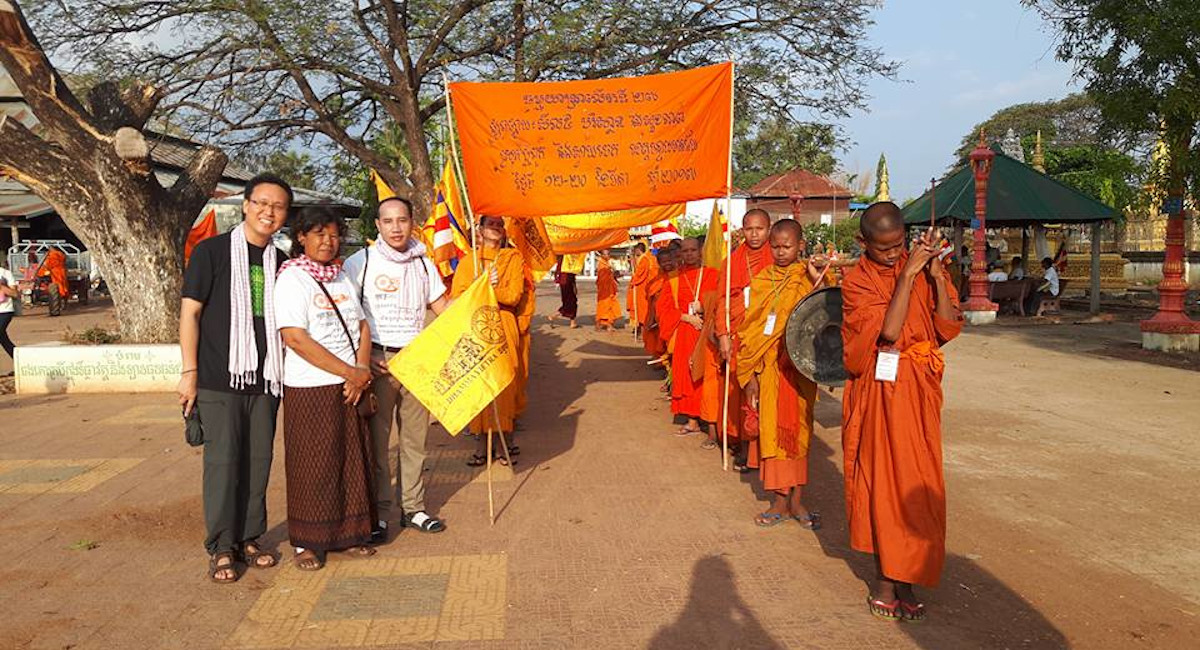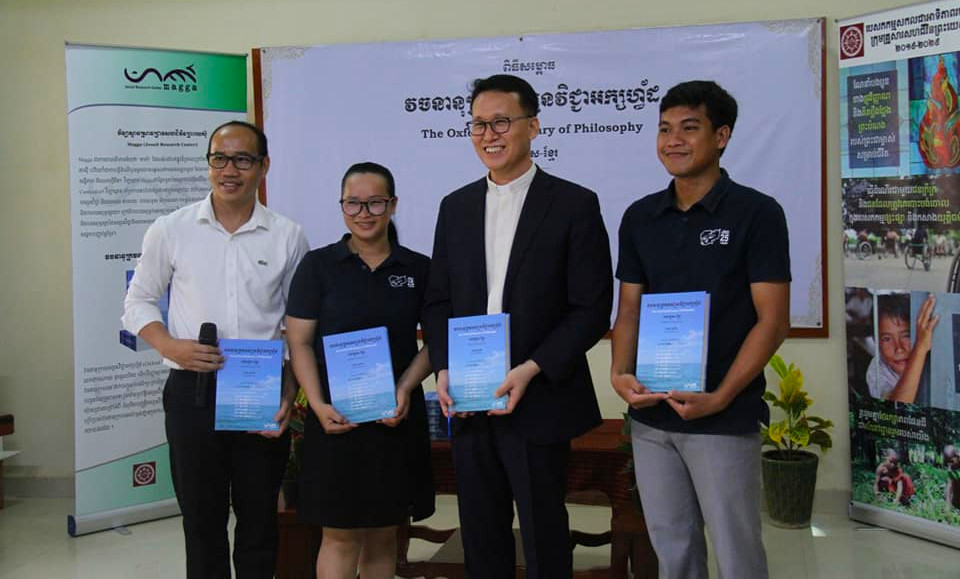 San Puthesen (in a white shirt) is a former Buddhist monk now working as a researcher at the MAGGA Jesuit Research Center in Phnom Penh. He recounts how he met the Jesuits, and the importance of the education and intellectual apostolate to Cambodian society.
San Puthesen (in a white shirt) is a former Buddhist monk now working as a researcher at the MAGGA Jesuit Research Center in Phnom Penh. He recounts how he met the Jesuits, and the importance of the education and intellectual apostolate to Cambodian society.
I come from a poor farming family in the rural Khmer village of Mongkul Borei in northwest Cambodia. The enduring civil war took away my childhood education and separated me from my family when I was 10 years old. My parents fled to another village while I stayed at a pagoda with Buddhist monks to receive my primary education. At 15, I became a novice monk. I followed the Buddhist curriculum of general knowledge, including learning the Pali language. I enjoyed the experience and graduated from the Buddhist university in Battambang in 2012.
Although I was happy and well appreciated as a Buddhist monk, I had to leave monasticism in 2013, after 15 years as a monk, to support my parents who lived in great poverty. Since I had a Bachelor’s Degree in Pali and Buddhism, and a Master’s Degree in Law, I could earn a living by giving lectures at some colleges. To save on expenses, I continued living in the Wat Kandal Buddhist temple along the Battambang city riverside.
I stayed in a small room at the residence of my English teacher, Bob Maat, a former Jesuit Brother from the U.S. Bob was a holy man, working for peace and reconciliation in Cambodia, inspiring many Khmer youth and Buddhist monks through his humble and simple life. In 2014, I met Fr In-gun Kang SJ, a good friend of Bob’s. I was thrilled with their profound conversations on Buddhist-Christian dialogue and peace movements in Cambodia and the world.
Since I met Fr Kang, I have been sharing my knowledge of Pali and Khmer languages with him while conversing on philosophy, religion, society, and the meaning of human life. Increasingly, I felt Fr Kang to be an exemplary scholar for young Khmer learners. From this warm encounter with him, I decided to commit myself to the intellectual apostolate of the Jesuit mission in Cambodia.
In January 2015, I left Battambang to work with Fr Kang in Phnom Penh as his Teaching Assistant at the Royal University of Phnom Penh (RUPP). Assisting Fr Kang in his lectures on Medieval Philosophy, I learned that the source of Christian inspiration is the agapeic love of God. I realised that the Jesuits and their collaborators have taken care of the poor and marginalised for a long time. Jesuits like Fr Ashley Evans, Fr Tae-jin Kim, and Fr Kang have been actively engaged in higher education. I was very impressed by their dedication to the urgent needs of the post-war Cambodian society, especially in reestablishing lost human resources.

Seeing the lack of reading materials in Khmer and the urgent need for Cambodian intellectuals, Fr Kang established the MAGGA Jesuit Research Center in 2015. As a full-time researcher at the centre, I worked with him to translate and publish academic books on philosophy and religion. I also accompanied Fr Kang during his lectures, seminars, and interreligious dialogue with Buddhist monks and Muslim leaders. In doing so, my mind and heart became broader and deeper.
Last year, Fr Kang encouraged me to teach a course on Political Philosophy to Catholic seminarians at the St John Mary Vianney Seminary in Phnom Penh. Following his respectful approach to the Buddhist monks at the Preah Sihanouk Raja Buddhist University in Battambang, I shared my knowledge with the seminarians with friendly reverence. As a former Buddhist monk, it was a joyful and unforgettable experience for me to become a close friend to future Catholic priests in Cambodia.
I am privileged to collaborate with the Jesuit mission in Cambodia, especially in the intellectual and higher education apostolate. Since the Jesuit Province of Korea took charge of the Cambodian Mission in 2007, many Khmer students have had the opportunity to study at Sogang University in Seoul for their Masters and Doctoral degrees. Fr Kang and Fr Jae-wook Lee accompany these students from their selection to the completion of their studies, and organise meetings with Sogang alumni who are now professors at RUPP and professionals in various fields in Cambodia. Furthermore, the Korean Province is supporting the Masters in Philosophy programme at RUPP, which Fr Kang established in collaboration with other professors in 2016. Given that the Cambodian society suffers from a lack of moral and intellectual leaders, this programme is of utmost significance.
Higher education is impossible without long-term commitment and substantial financial support. Despite the national tragedy of the genocide and civil war that had taken away everything from my people, I nurture a seed of hope that Cambodians will rise again if our new generation receives proper education. My hope grows daily as I work for the Jesuit intellectual and higher education apostolate. I am grateful to all the Jesuits, collaborators, and benefactors. May the gracious, loving God bless them always.

